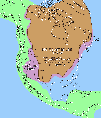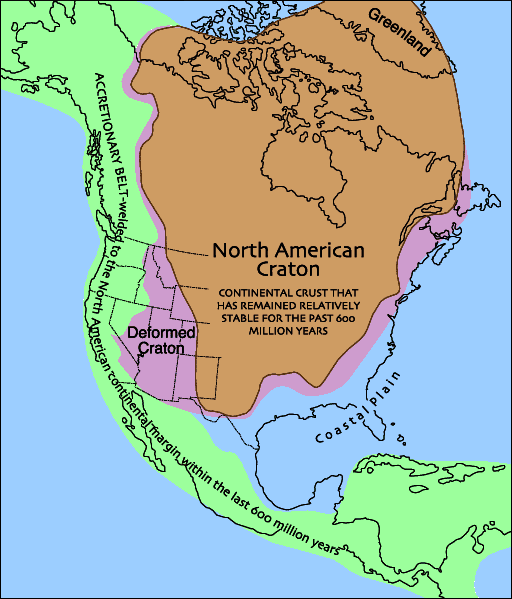File: North america craton nps.gif
North_america_craton_nps.gif (512 × 599 pixels, file size: 32 KB, MIME type: image/gif)
North American craton.
The brown area shows the part of the North American continent that has been stable for over 600 million years. This region is made up of a basement older Precambrian metamorphic and igneous rock that is mostly covered by a relatively thin cover of younger sedimentary rock. Geologists call these long-stable continental cores cratons.
The green area on the illustration shows new continental material that was added relatively recently, within the last 600 million years or so. Continents can grow when two plates collide, welding, or accreting, the two pieces together. Continents also grow when oceanic crust is scraped off oceanic plates as they sink in subduction zones.
The purple area fringing the stable continental core is made up of older Precambrian basement that was deformed during plate collisions that occurred within the last 600 million years. The force of collision produced great folds and faults that sometimes penetrated deep into the continental interior. Where the crust was uplifted, these folds and faults are exposed at the surface, allowing geologists to piece together the ancient history of our continent.
http://www2.nature.nps.gov/geology/usgsnps/pltec/nacraton512x599.gif
File history
Click on a date/time to view the file as it appeared at that time.
| Date/Time | Thumbnail | Dimensions | User | Comment | |
|---|---|---|---|---|---|
| current | 19:43, 16 June 2006 |  | 512 × 599 (32 KB) | Dinshaw Dadachanji (talk | contribs) | [http://en.wikipedia.org/wiki/Image:North_america_craton_nps.gif source and rights] |
You cannot overwrite this file.
File usage
The following 2 pages use this file:
